On The Record with Sean Morphy, Former Head Coach for Gannon Men’s and Women’s Polo
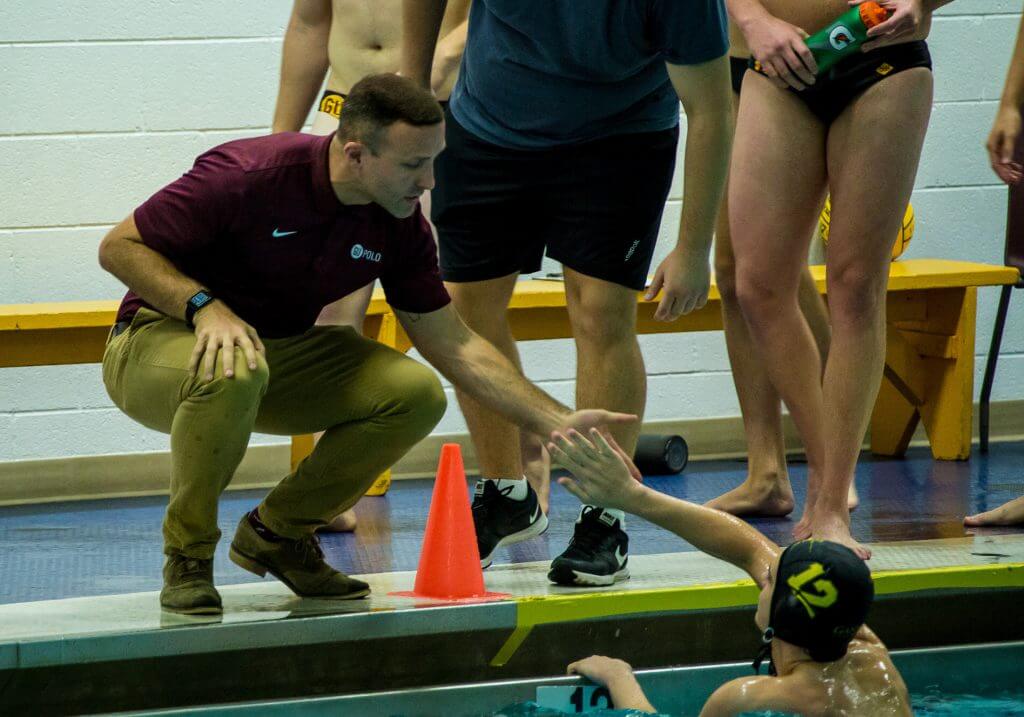
By Michael Randazzo, Swimming World Contributor
A story deserving far more attention than it received was the impressive 2018 campaign enjoyed by Gannon men’s water polo. The Golden Knights reeled off twenty-straight wins to open the season, gaining recognition as one of the top Division II programs in the country. Not even a deflating loss to McKendree in the Mid-Atlantic Water Polo Conference-West semifinals could strip the luster off a 20-1 season,
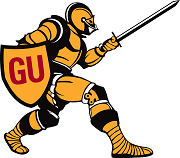
In the midst of all this success, Sean Morphy, Gannon men’s and women’s head coach, made an unexpected change: after six years on the Golden Knights staff, including four years leading the men’s and women’s teams, he will step down to focus on his family and his teaching career.
It was a tough decision for a Gannon-lifer; until senior goalie Brett Rehrer broke the record this year, Morphy—who played from 2001-04—was the program’s career leader in saves. He and his brother Brian, an assistant who also played at Gannon, and Marko Sadikovic, a former Golden Knight standout turned volunteer assistant whose brother Zarko led the team this season with 72 goals, created a true “band of brothers” atmosphere in Erie that translated into unprecedented success.
Prior to the recent announcement by Gannon Athletics of the hiring of Shane Unger, Socal Water Polo Club age group coach, as his replacement, Morphy spoke about his team’s thrilling 2018 campaign, the incredibly fertile environment for polo in Northwest Pennsylvania, and how the sport continues to thrive outside its presumptive home of California.
– Talk about your background playing polo in Northwestern PA.
I’m from Erie, grew up here, played in a local private high school [at Cathedral Prep].
I wouldn’t call [Erie] a hotbed but there’s a lot of teams; four or five high school teams and three college teams, all in a city of 200,000 people. Outside of California, I don’t know that there’s that many teams in such a small area.
The pool at my high school was four lanes [and] 20 yards—that’s what we were practicing in. Not a great situation to learn water polo in.
I graduated and went to Penn State for a year. Gannon had started their varsity program and were able to offer a scholarship. I literally walked into the coach’s office at the Gannon rec center one summer day after my freshman year and said: I played in high school and I’d love to play again in college.
That’s what started my collegiate water polo career. I played four years, graduated, left, did some stuff, then came back as a teacher. I’m now back in that position on staff as a teacher at the university.
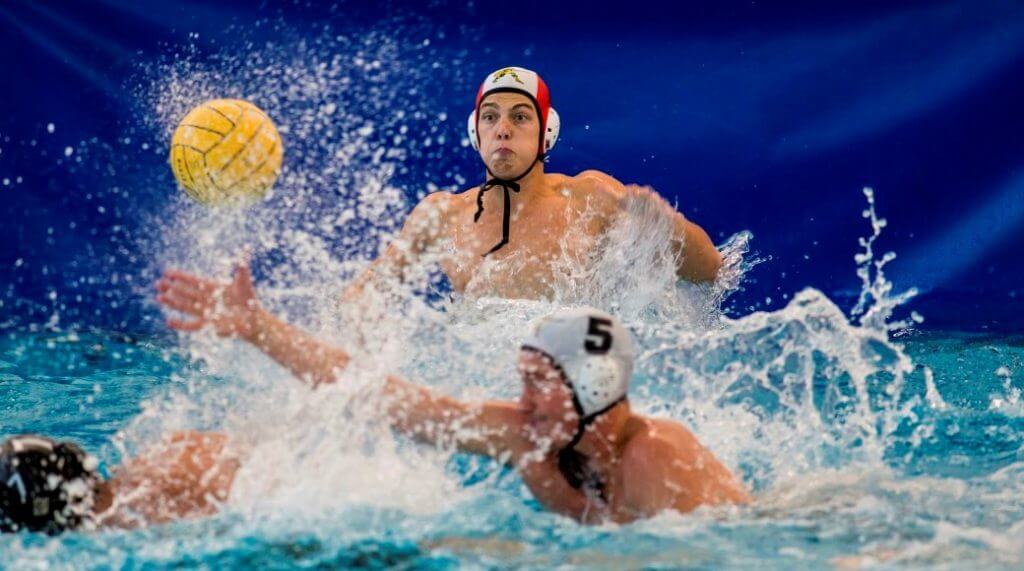
Golden Knights goalie Brett Rehrer. Photo Courtesy: Gannon Athletics
[Don Sherman, former head coach] retired; I was his assistant for two years. When he retired I took over, and actually this was my last season. I started teaching again full-time; the men’s and women’s program is being taken over [Shane Unger], who will be on campus next week.
– You’ve had a great season and a great run at Gannon—and now you’re leaving!
The men’s program is in such good shape, we actually played this season with a starter essentially on the bench recovering from shoulder surgery. And our seventh man from last year was on the bench as well.
[Gannon University Hires Shane Unger as New Head Water Polo Coach]
For the program going forward we’re essentially graduating three starters but that’s because we had two [players] riding injuries, and they’re ready to take those spots over. Our freshman [Robert Bolmanski] started essentially the entire season so he’s ready to take over the guard position and run the point.
So, the program is in such good shape that [all that’s needed is] recruiting a solid goalie and a couple of offensive players. But the goals next year are already built in the program, including who’s going to scoring next year. We need to solidify a couple of spots; I’ve been working with students, hopefully pushing back campus visits a bit.
The program is in great shape, especially for Shane coming in.
– So why leave at this moment?
I don’t know how it’s going to sound but coaching was something—when I took over it was because the program is what was important. I had been there, been the assistant, gone through it, knew what the potential was.
When Coach Sherman retired, I was worried for what was going to happen to the program. I put my hat in the ring and wanted to make sure that the way Gannon had been was the way it was going to continue—that the family of the university and the family of the program was going to stay true to the way it had been.
It was never a long-term goal of mine to be a head water polo coach. I’m a teacher and video editor by trade and that’s what I do and that’s what I love.
I have a son at home going into high school next year, so spending those weekends at home seeing his basketball and soccer games was something that was super important to me. When the business I had with the university prior [to coaching] opened back up, it was a transition that I did not take lightly but it was something I knew I was ready to do.
– If this season was your swan song–and apparently you knew beforehand this was going to happen—you and the Golden Knights made it a memorable finish.
We built up to that. The last couple of years we had a roster that was cobbled together over the years. We only had one true four-year starter in our goal—Brett. He was the foundation around how we built this program. His freshman year was my first as the coach.
We got a couple of great transfers—his brother Jake transferred in, he’s our other senior. [Zarko] Sadikovic is the brother of another player who graduated; my volunteer assistant Marko. We had this team of brothers; the senior class essentially had two brothers and a twin from a former graduate. My brother and I were the coaches, and then we had a class of a junior and a sophomore [Thomas and Anthony Squeglia] who came from the high school that me and my brother came from.
The last two years the guys had gone through the Mid-Atlantic [West] side of the conference undefeated; came up a little bit short two years ago. I don’t remember what our record was but we’d only lost to Hopkins, Salem and Mercyhurst once—and it all happened in the games that seemed to matter in DIIs and Mid-Atlantic.
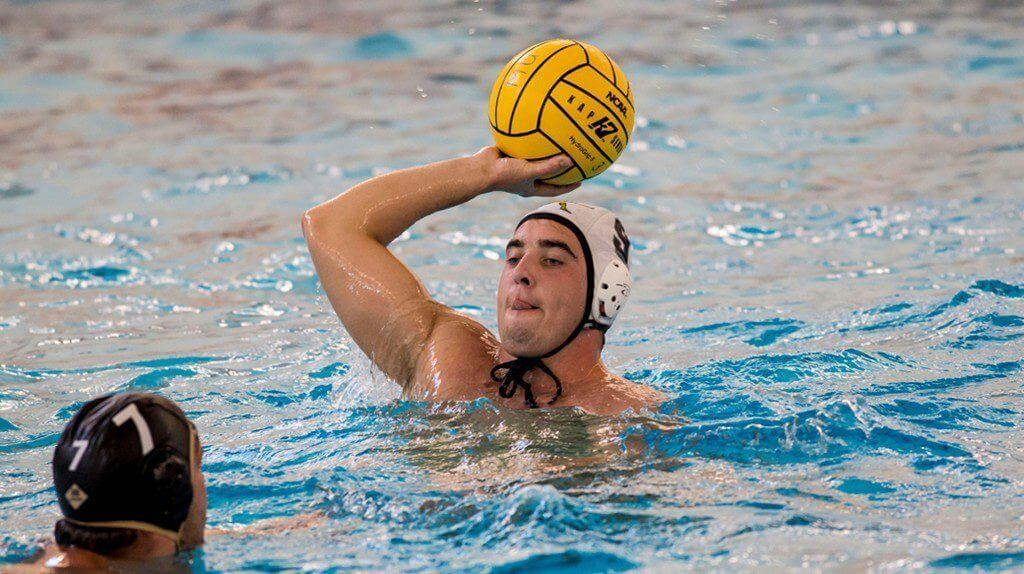
Zarko Sadikovic Photo Courtesy: Gannon Athletics
Last year they finally put it all together. They went through DIIs, they went through the Mid-Atlantic regular season undefeated and got what they needed to make it to the conference championship. We had a good showing there—we only won our final game, good for seventh place—but against George Washington we lost by three or four.
I said at the beginning of this year: if we want to be a top-twenty team in the country, it’s going to take something special. We’d have to go undefeated for the season. The guys bought in; every practice and every single time we went anywhere, we knew that when we walked on deck we could be the best team there.
It was something—just the magic of the season—and a senior team that put it all together and they just really believe it through and through.
– Given what you were accomplishing—this season and in the past—how were your players able to deal with the pressure that everyone is gunning for you?
Knowing that we’ve had that kind of target on our back, the guys know that when it comes to conference games, they’ve got to really play hard because everyone like to beat us. We’re the team everyone really wants to take down.
I don’t think anyone realized how it was going until we were in Connecticut—it was week three or four—and we ended up playing MIT and Cal [Lutheran] and squeaking those game out. We had a comeback win against MIT—I think we were down 5-1 at one point—and then these guys realized: We can really do this.
Once we got through that weekend in Connecticut we knew we could do it but it was going to get harder every weekend with everyone game-planning for us.
– You’re playing that game that mattered the most in your season against McKendree in the MAWPC-West semifinals—and the Bearcats end your streak.
Any time you play a team multiple times in a season, it gets harder and harder to beat them. We came across that with a couple of teams we ended up playing in our conference—we beat each other up a little bit—especially on the DII side with Mercyhurst and Salem.
We ended up playing Salem four or five times this year; it gets tougher and sometimes it depends where you’re playing. The game can be rough or it can be smooth where everything gets called. We tend to do better when things go quickly and more stylistic—that’s our style of play.
That wasn’t what the [McKendree] game was; it was rough and tough and they came out on top because they were ready for it. They went after everything and we were a little bit short on a couple of our shots.
[McKendree ends Gannon’s 20 match win streak in MAWPC-West semifinal]
We had a couple of good weeks of practice but a couple of injuries—we were missing a guy [Drago Marjanovic] that had been a big part of our season, our first guy off the bench. He’d been out for a couple of weeks so when we put him back in he was just a little bit off.
We might have hit the crossbar 10 or 15 times; we were just coming up short on finishing shots. And that’s where it mattered.
– After such a great season, how does this change your attitude about a DII program that aspires to be the best at any level in the country?
That was our goal at the beginning of the season. That’s why [our team] got to that point—20-0—and looked to become a top 20 team, not just DII-wise but in the country. That’s the best part about water polo. I can’t imagine another sport, when you’re saying to these kids: We play Bucknell, Princeton, the top 20 teams on this side of the country. So, you’re still playing the best kids. Just because we’re a DII program doesn’t mean we’re any less than what’s being offered anywhere else.
– Talk about the selection process for a new coach. You’re a local guy and many of your players come from the area—and now they’ll be coached by someone who has spent his entire life in California.
That was our main worry when they were looking at new coaches—[finding] somebody who would respect that the roster of both programs [contains] 30% local kids. When you’re thinking about the national level of water polo and trying to be a top-20 team, that doesn’t make a lot of sense. But we literally started three kids from [our] area and our first player off the bench was an Erie kid. And we were good!
It’s something that Shane realized the second that he came in, because a lot of people will say he came in from California and has connections back there—it will be so much better. The local kids around us have more California teams than we do and we were beating them.
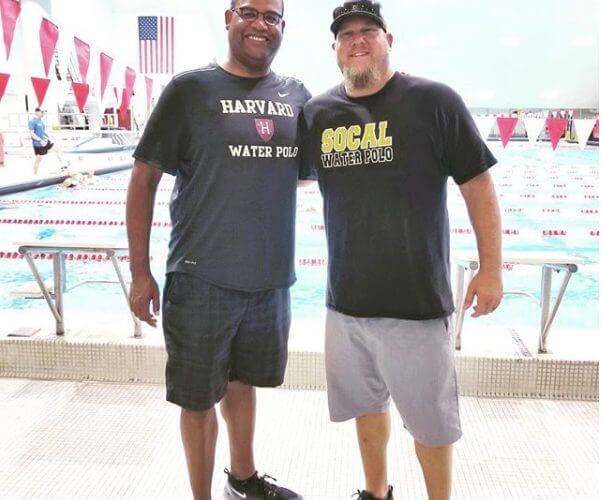
Harvard’s Ted Minnis and Shane Unger. Photo Courtesy: S. Unger
It’s not that; it’s finding the right pieces for your team and coaching them in a way so that they’re all playing together. Whether these kids are from Erie or from California, all of them bought in. They were a family, they all lived together—we literally have three sets of brothers on the team who were coached by brothers.
It’s worked itself out that this team is bigger than being from any particular part of the country or [one player’s] high school is better than anybody else’s high school. You’re here, you’re part of Gannon, you want to win and you want to do it with these guys.
– Your brother Bryan was your assistant coach last season. Will a Morphy remain involved with Golden Knights water polo?
Every assistant coach that we have has been a volunteer. He has said that he’s interested in being a part of the program. I’m still going to be on campus, still around [but] the idea of giving up cold turkey is not something I like. I’ve talked to him and we’re going to step away from the program for a year or to so that Shane can identify this team as his and do what he needs to do.
I’ll answer questions and help out if anything is needed but I want to make sure that he’s got an identity that is his own and still part of what Gannon is because we’ve got a good core of guys who can make that happen.
Maybe in a year or two once this class is cleaned up and everybody he has recruited has come in, then we can start helping out.
– There’s a lot of changes going on in the sport; Austin’s men and women come on line this year, McKendree is new, LIU Brooklyn is starting a women’s team next year and now Millikin University in Illinois will add men’s and women’s polo in 2020 – 21. What do you make of all this?
At the DII level, what I think would be fantastic is have that three or four Midwestern and Eastern teams that would play for a true DII championship, the way they do DIIIs, as opposed to just our CWPA championship.
The more teams the better. The talent pool at the high school level is going underserved in that, we are giving kids who can compete at a top-20 level for DI through DIII programs. There are kids there at this level that may not be because they’re not being recruited.
We have all this East Coast talent—especially around Pennsylvania—the Michigan and the Great Lakes area has a high school situation where these kids just assume they can’t play because Cal’s not calling them to join the team.
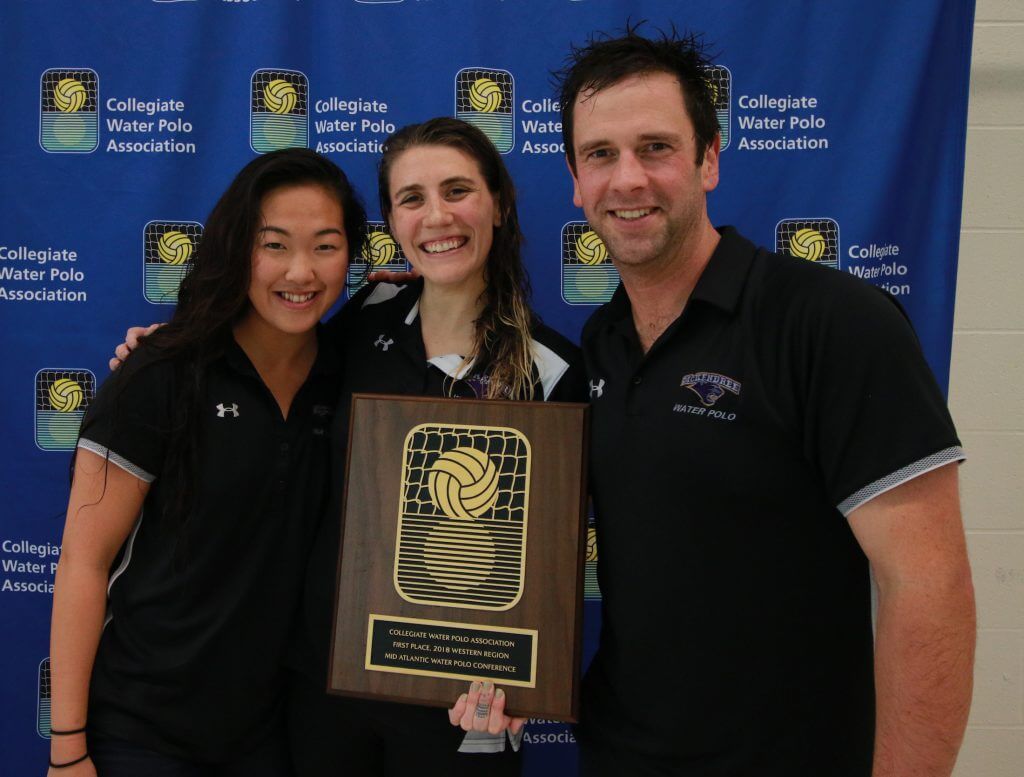
Colleen Lischwe flanked by coaches Jen Liu and Jeff Passwater. Photo Courtesy: CWPA
And if DII schools are able to offer scholarships that can help their collegiate careers, it’s fantastic for the student athletes and for the sport as a whole.
– Colleen Lischwe, the McKendree head coach is one of the few women coaching men at the collegiate level. She’s adamant that she be judge on her results, not her gender—and the results are pretty good so far.
That program has come a long way and she’s been there the whole time. They started from club [two years ago] and turned it around so quickly. It took programs like ours and Mercyhurst years and years to get to that level. That speaks to the ability to recruit and to high school players who are ready—and what water polo at the high school level has done at finding those kids.
[On The Record with Colleen Lischwe, Head Coach of McKendree Men’s and Women’s Water Polo]
I think she’s done a great job with the program; any time a DII team finds success at any level it’s good for all of us.
– What is the thing you’re going to miss the most about your time coaching the Golden Knights?
Getting to know these kids on the level that you do when you’re spending weekends with them and on long bus rides—the conversations that you get to have.
As a teacher, you see them for two – three hours a week, and they’re gone and live their lives. When you’re a coach, you’re with them, eating meals with them, and spending hours and hours on the bus, doing homework; play[ing] board games on the bus or watch[ing] movies together.
You get a sense of how good they are and their passion for their sport and their school. It’s refreshing; if you do this five or six years—and some coaches have been doing this for ten or twenty years—it’s a struggle to keep the energy all the time. Then you see this freshman or sophomore coming in and he’s signed his NLI and bought the shirt from the bookstore—and is excited to own a shirt that says: Gannon Water Polo.
There’s an excitement in every one of these kids that’s so much fun to watch and to remember that we’re all here for the same reason, and that’s to play water polo at this university and to make ours a winning program.
The seniors this year really embodied that [spirit] and took the whole team with them on a fantastic journey.



